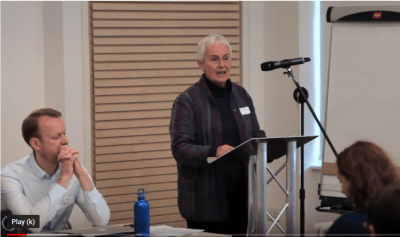legislation & policy
Quaker report opposes increasing militarisation
27/06/2014Ekklesia
Ekklesia
“The stirring music, smart uniforms and synchronised marching that characterise Armed Forces Day are a glossy front behind which sits a deliberate strategy to manipulate the public,”
The British Army frontline: women and children first
03/06/2014Open Democracy
Open Democracy
Child Soldiers International: We now face the prospect of 16 year old girls joining the army in combat roles.
ForcesWatch submission to Defence Select Committee inquiry on Military Casualties
March 2014
ForcesWatch's submission to the Defence Select Committee inquiry on Military Casualties draws on our research published in The Last Ambush.
Military-style discipline to raise standards in state schools
28/01/2014The Telegraph
The Telegraph
Former soldiers without degrees will be fast-tracked into teaching and more cadet force units will be established as part of a dramatic expansion of a “military-style” ethos in English state schools
Militarisation in everyday life in the UK: a conference report

In response to the recent developments in the UK, there has been an increase in critical academic studies, media coverage, and work by campaigning organisations and others on these issues. On 19 October 2013, around 70 academics, activists, campaigners, and writers came together in London at the Militarisation in Everyday Life in the UK conference organised by ForcesWatch.
Presentations from the Militarisation in Everyday Life in the UK conference
November 2013

The Militarisation in Everyday Life in the UK conference was held in London in 2013 and was organised by ForcesWatch. It brought together academics, writers, activists and campaigners concerned about the implications of the militarisation of everyday life in the UK. 12 presentations were filmed. For more details and background reading, see here.
Why are education projects run by ex-services being prioritised?
On 15 November 2013, the Department for Education announced "£4.8 million to projects led by ex-armed forces personnel to tackle underachievement by disengaged pupils".
ForcesWatch has a number of concerns about the military-led 'alternative provision' being developed in schools: who benefits? the armed forces certainly will; military-led 'alternative provision' targets young people seen to be 'failing' - precisely those who need more options and, if channelled into the forces, are most at risk in warfare; the policy is based on limited evidence and ideological assumptions; will there be space for ethical issues around conflict to be addressed?
Welsh bishops urge army to raise enlistment age to 18
08/11/2013Wales Online
Wales Online
The Ministry of Defence has come under pressure from the Church in Wales and campaign group Child Soldiers International which is calling for an end to recruitment of under-18s to the Army
Bishops attack army on recruitment of minor while teen enlistment figures plummet
08/11/2013Child Soldiers International
Child Soldiers International
Recruitment of 16-year-olds down 40% on previous year; former Armed Forces minister says “Time is right” to review recruitment age
Open letter to Minister of State for the Armed Forces on armed forces recruitment age
08/11/2013
"We call for the minimum recruitment age to be returned to 18 years. This would be a fitting memorial to those thousands who, whether unlawfully recruited as minors during the First World War or recruited to fight in other conflicts, were exposed to death, injury and trauma that no child should ever experience."
